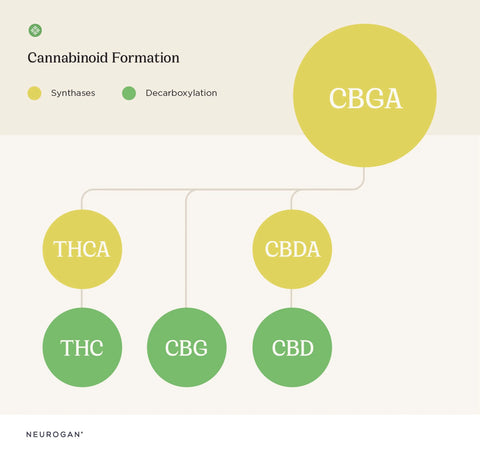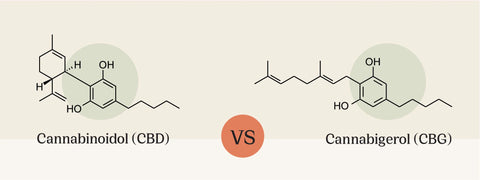If you're like us and have your finger on the pulse of cannabis news, you've probably seen a lot of buzz surrounding a new cannabinoid, cannabigerol (CBG).
It's not technically a new cannabinoid by any means, but the popular cannabinoids CBD and THC have long overshadowed its attention. By now, you may be familiar with CBD for its benefits towards supporting a healthy and natural state of well-being—so what is CBG good for and is it something worth adding to your wellness routine?
Quick Overview
CBG, or cannabigerol, is a non-psychoactive cannabinoid primarily found in young cannabis flowers and acts as a precursor to CBD and THC. It supports anti-inflammatory effects and can stimulate appetite.
CBD, on the other hand, has shown signs of treating anxiety. Both compounds are legal and non-psychoactive. CBG oil combines CBG extract with a carrier oil for easy dosing but is often in low concentrations in mature plants, making it rare and potentially costly.
Main Difference Between CBG and CBD?
CBG is a minor cannabinoid found in young cannabis flowers, acts as the precursor to the major cannabinoid, CBD. While CBG and CBD have similar effects on supporting normal inflammatory function, mood, and stress, CBG is best known for concentration and focus, while CBD excels in promoting a healthy sleep cycle, muscle recovery, and overall comfort.
Here is a summary of CBD vs CBG difference:
- The concentration in mature cannabis flowers
- The cannabinoid's molecular structure
- How they interact in the body (pharmacology)

Why Is CBG More Difficult To Produce Than CBD?
Cannabigerolic acid (CBGa) is formed in the early flowering period of the cannabis plant (3–4 weeks), so they're most abundant in younger cannabis plants. As the plant is exposed to UV from the sun, CBGa transforms into either THCa, CBDa, or CBCa, depending on the plant strain and other environmental factors.
Because CBGa transforms into the more abundant cannabinoids, CBG is present in low amounts as the cannabis plant matures, making it a minor cannabinoid (less than 0.1%). CBG extraction requires the use of specialized equipment called a chromatography apparatus to isolate the CBG from other cannabinoids for more refined CBG oils. However, plant breeders are experimenting with genetic manipulation to design hemp strains that preserve higher concentrations of CBG in its maturity alongside THC and CBD.

What Is CBG Hemp? Genetically Modified Hemp Plants
CBG hemp refers to cannabis strains that may have been genetically bred to contain higher levels of CBG.
Most cannabis flowers contain less than 0.1% CBG when they've fully matured, but innovation in gene manipulation has led to new cannabis strains that contain higher concentrations of the sought-after cannabinoid.
CBD Vs CBG Cannabinoid Structure

If we're comparing the molecular structure of CBD and CBG—that is, the arrangement of atoms that make up the cannabinoid—we'll see that they're quite different. This is important because the molecular structures of these compounds indicate how they may behave in the body, a.k.a their pharmacology.
The shape of these structures gives us an idea of how they bind to different receptors to carry out potential therapeutic effects. You can think of receptors like keyholes, and the shape of certain molecules has to fit perfectly into the receptors to elicit a specific action.
Cannabinoids primarily interact with the body's endocannabinoid system, which is tasked with regulating other body systems, including the immune response, metabolism, hormones, stress, and much more.
There are two main cannabinoid receptors in the endocannabinoid system — CB1 and CB2. CBD has a low affinity to bind to these receptors but instead helps increase the sensitivity of these receptors to bind to internal cannabinoids, called endocannabinoid or phytocannabinoids (plant-derived) found in cannabis
While CBG seems to have a better molecular shape to interact with the CB1 and CB2 cannabinoid receptors in the brain, CBG's shape also allows it to interact at the a2-adrenoceptor site to activate the body's sedative and pain-masking response [1].
CBG Benefits Vs CBD — Which Should I Choose?

If you're looking for CBG vs CBD benefits, you're probably coming across a wide range of information as the research on pure CBD oil vs CBD is still limited and most of the reports on the advantages of CBG are anecdotal.
As more popularity surrounds the cannabis industry in health and wellness spaces, interesting studies are emerging to show us that CBG has potential for unique therapeutic benefits that shouldn't be underestimated.
Support A Healthy Stress Response
Both CBD and CBG can help manage stress.
Stress is part of our fight-or-flight response and experiencing stress is not a bad thing. It's primary function is to boost energy and reaction time to help us out in emergencies — like fighting off a tiger.
While we're not faced with many tigers in everyday life (hopefully), so our fight-or-flight response reacts to new stressors such as tight work deadlines, financial problems, health issues, or relationships.
When our stress isn't properly managed, we never activate the rest-and-digest response, which handles our recovery and digestion. When this stress response system is out of wack, it can lead to a constellation of health problems.
GABA is a neurotransmitter that acts as a brake pedal to the stress response [2]. In preclinical studies, CBG and CBD interact with GABA activity, slowing the breakdown of GABA in the brain, which helps to induce a sense of calm, counteracting the stress response's hyperactivity [3].
Other lifestyle changes you can do to mitigate your stress levels include:
- Regular exercise
- Prioritize sleep
- Eat a well-balanced diet of nutrient-rich foods
- Take up a meditation practice
- Professional counseling and therapy
Appetite Stimulation
CBG may help stimulate your appetite.
There can be many different reasons people may experience a lack of appetite from hormonal changes, adverse side-effects from medications, and illnesses. Low food intake can lead to poor nutrition, fatigue, weakness, and a list of other health issues.
What does science say about the benefits of CBG vs CBD oil when it comes to appetite? Well, CBG is also the precursor to the munchie cannabinoid, THC, and these two compounds share appetite-stimulating effects. THC, the well-known "munchie" compound, and when used together with CBG, they may offer even more potent appetite-stimulating effects.
CBG is a promising alternative to the high-inducing THC cannabinoid for someone looking to support a healthier appetite. It's been studied that CBG encouraged appetite stimulation in rats to levels of normal food intake without negative side effects [4].
Here are other ways to overcome a poor appetite:
- Increase your rate of physical activity
- Plan and schedule your meals
- Boost the flavor and smell of your food with aromatic herbs and spices
- Choose calorie-dense foods for more energy
To Natural Inflammatory Response
Both CBG and CBD may help to support a healthy inflammatory response.
Inflammation is a natural part of our immune system. It's a complex system designed to protect us from our environment, but it can lead to severe and long-term damage when it becomes out of balance.
In a healthy immune system, immune cells scout the body for potential threats. When you sustain an injury, these cells call for backup to eliminate the threat, which causes a normal inflammatory response [5].
The endocannabinoid system is tasked with maintaining equilibrium in the body, and one of its important functions is tied to regulating the immune response.
A healthy ECS can help make sure that the immune cells don't go overboard on the attack, causing damage to the body's cells [6]. Any compound that strengthens the ECS can have a beneficial outcome for the immune response and inflammation.
According to one study conducted on rats, CBG has limited actions on specific inflammatory markers that cause inflammation in the gut, which helped to reduce signs of inflammatory bowel disease and bladder dysfunctions in the rats [7].
While CBD is quite famous for its benefits towards supporting the body's natural inflammatory response, more research is underway for the potential benefits of CBG.
To Support Natural Recovery And Discomfort
CBG and CBD may support recovery & ease discomfort
A popular comparison is CBD vs CBG for pain. The verdict is still up there—many people have been using CBD to manage their joint and muscle pain without reaching for prescription medications and find similar relief with high potency CBG products too.
During a strenuous workout, you're pushing your muscles to work harder than they're used to, causing microscopic tears to the muscle fibers. This is what's believed to cause achy muscles and discomfort, which can prevent you from hitting the gym again.
Many athletes are looking for ways to decrease recovery times between workouts to maximize their efforts. With less pain in the muscles, you can get back into the action without causing injury and discomfort.
One of the reasons you may feel pain is the microscopic tears to your muscle fibers, which then induce the inflammatory response we mentioned earlier. Because the endocannabinoid is closely linked to this immune response, any compound that strengthens the ECS can help mitigate the effects of inflammation and the pain that comes with it.
On top of this, both CBD and CBG may have analgesic properties through interactions with unique pain-receptor sites that inhibit pain signals to the brain and relax tight or spastic muscles [8].
To Counteract The Psychoactive Effects Of THC
CBG and CBD may mitigate undesirable effects of THC (Paranoia, Anxiousness, and Impaired Cognitive Function.)
THC is the primary psychoactive compound produced in the cannabis plant. It has an affinity to bind with CB1 receptors in the brain. Its interaction with the body's cannabinoid receptors causes a flood of neurotransmitter release, including serotonin, dopamine, and norepinephrine, that alters our state of mind and perception associated with the psychedelic high.
But if you need to choose one cannabinoid—CBG vs CBG—to counteract THC's psychoactive properties, there's one that appears to have the most substantial effects, CBG. It's been observed anecdotally that young marijuana strains containing more CBG than THC limited the plant's psychoactive effects.
Upon further investigation, CBG blocks THC's psychoactive effects by preventing THC from binding to the cannabinoid receptors that activate serotonin release [9].
THC is a cannabinoid with many potential therapeutic benefits of its own. However, due to its mind-altering effects, it remains illegal in many parts of the world. Even with changes in its legal status in some states, people are still turned-off by the compound. CBG products, including oil and CBG gummies shows promise in mitigating THC's psychoactivity so that more people may be able to include it in their health regimen.
For Anticonvulsant Properties
CBD is found to be more effective as an anticonvulsant.
There is currently only one FDA-approved drug on the market made from pure CBD derived from hemp plants, Epiliodex, prescribed for Lennox-Gastaut syndrome, and Dravet syndrome, which are severe and rare forms of epilepsy.
Researchers found that the. most well-known cannabinoids, CBD and THC seem to be effective in murine studies for anti-epileptic effects. However, the psychoactive nature of THC makes it an undesirable compound for therapeutic use [13].
While CBG may have some anticonvulsant effects, it doesn't seem to be as potent as CBD and THC.
For Neuroprotective Properties
CBG may have more neuroprotective potential over CBD in preclinical studies.
Neuroprotectants are substances that protect brain cells (neurons) from degenerating due to age, genetic predisposition, traumatic injury, or oxidative stress. Antioxidants and anti-inflammatory compounds tend to also be excellent neuroprotective agents.
In anecdotal accounts of CBG oil use, many people report feeling a calm, centered focus, making it ideal for daytime use for productivity and concentrated tasks. Some even report of getting relief from ADHD when taking CBG.
When it comes to looking at CBD vs CBG oil for brain health, it looks like CBG has a slightly promising edge, but more research will tell.

Research on CBG Extract Uses
Most research on CBG uses in health and wellness is conducted on animals, but they have been promising for future human trials, which will be critical for fully understanding this CBG extracts' therapeutic effects.
- CBG and other cannabinoids show antibacterial effects in pre-clinical trials against methicillin-resistant staphylococcus aureus (MRSA) bacterial infections, a highly contagious skin infection [10].
- In murine studies, purified CBG was found to show positive results for treating inflammatory bowel disease (IBD) by mitigating the overactive inflammatory response in the gut [11].
- There are many anecdotal reports of CBG for bladder dysfunctions. In murine subjects, CBG isolate was found to reduce acetylcholine-induced urinary bladder contractions [12].
Minor cannabinoids are becoming more popular as research like this emerges on their potential benefits, but there are still no FDA-approved cannabis-based products for these conditions. It's always best to consult with your health care professional for advice before turning to any CBD or CBG oil.
Is CBG Legal? CBG From Hemp Vs. Marijuana Plants
CBG operates under the same regulations as CBD products in the United States. It's entirely legal as long as it's harvested from hemp crops.
Hemp is defined as cannabis with less than 0.3% THC—the main psychoactive cannabinoid. Young, flowering marijuana plants also produce CBG, but this source of CBG is not federally legal.
However, CBD regulations may still vary from state to state and have the potential to change over time. Always make an effort to stay engaged and actively follow your local state laws to stay informed.
Unlike THC, CBG does not produce a high. So you can enjoy the benefits of CBG without worrying about any intoxicating effects.

CBG Oil Vs CBD Oil: What Does It Feel Like?
Cannabinoids can affect individuals differently depending on various factors, including lifestyle, genetics, product type, and doses as they primarily interact with the endocannabinoid system to support homeostasis.
Both CBG and CBD products taken internally seem to produce a sense of calm and relaxation in most people. The major difference is that CBG seems to be more reliable for daytime use for concentration and focus, while many people prefer CBD oil for general wellness and to support sleep. In fact, some users find that combining CBG with CBD provides even greater relief, as the cannabinoids may work synergistically to enhance each other's effects.
The effects of these products will depend on the brand and formulation of the product, so you should be sure to research the product and use it as directed to get the best results.
Final Thoughts: CBG vs CBD

Are there any added CBG benefits vs CBD? That depends on what you're hoping to get out of them.
CBG is slowly making its way into the mainstream of the CBD industry, which means you'll soon be able to shop with even more variety in the market.
While there's still more research needed to understand the full benefits CBG has to offer, it's unsurprising that it shares many similarities to CBD and THC. Rather than looking for a CBG isolate, CBG is better off than other cannabinoids, much like CBD is more effective in a full spectrum extract.
When shopping for CBD or CBG oils, make sure you're doing your diligence with research and shopping with reputable brands that can show you transparency in their business practice and have a reliable customer service team who can answer your concerns.
Neurogan CBG products are made from Farm Bill-compliant hemp crops with less than 0.3% THC in our full spectrum CBG. We think you should choose CBG gummies for pain to avoid THC altogether, our CBG products come in both THC Full spectrum & THC-broad spectrum extracts.
If you've tried a CBG product, we'd love to know your experience. Feel free to comment below.
FAQ
What is the Difference Between CBG and CBD?
CBG may have more neuroprotective potential over CBD in preclinical studies. CBG may also help stimulate your appetite, where CBD is found to be more effective as an anticonvulsant. In the end, both CBD and CBG can help manage stress.
What is CBG? What is CBD?
CBG is the precursor molecule to CBD and THC, the cannabinoid is a non-psychoactive minor cannabinoid mainly concentrated in young cannabis flowers. Cannabidiol or CBD is a cannabis-derived compound, it belongs to a class of phytochemicals called cannabinoids which are concentrated in hair-like, resin crystals speckled on the flowers and leaves of the hemp plant.
What does CBG Do?
CBG may help stimulate your appetite. CBG is therefore a promising alternative to the high-inducing THC cannabinoid for someone looking to support a healthier appetite. CBG also blocks THC's psychoactive effects by preventing THC from binding to the cannabinoid receptors that activate serotonin release.
Is CBD and CBG good for sleep?
While both CBG and CBD have the potential to aid in sleep, CBD is more commonly associated with sleep-promoting effects due to its interaction with the endocannabinoid system. CBG also shows sedative properties, but more research is needed to fully understand its effects on sleep.
Is CBG or CBD better for anxiety?
Both CBG and CBD have the potential to provide benefits for managing anxiety. While CBD is well-researched and recognized for its anxiolytic properties, CBG's specific effects on anxiety are still being investigated. CBG's interaction with various receptors in the brain suggests it may offer distinct advantages.
Which is more suitable for pain relief, CBG or CBD?
Both CBG and CBD have demonstrated potential for pain relief. While CBD is more extensively studied and commonly used for its analgesic properties, CBG's effectiveness in pain management is still being explored. Choosing between CBG and CBD for pain relief may depend on individual preferences and responses.
Resources:
- Navarro, G., Varani, K., Reyes-Resina, I., Sánchez de Medina, V., Rivas-Santisteban, R., Sanchez-Carnerero Callado, C., ... & Franco, R. (2018). Cannabigerol action at cannabinoid CB1 and CB2 receptors and at CB1–CB2 heteroreceptor complexes. Frontiers in pharmacology, 9, 632.Chicago
- Jie, F., Yin, G., Yang, W., Yang, M., Gao, S., Lv, J., & Li, B. (2018). Stress in regulation of GABA amygdala system and relevance to neuropsychiatric diseases. Frontiers in neuroscience, 12, 562.
- Banerjee, S. P., Snyder, S. H., & Mechoulam, R. A. P. H. A. E. L. (1975). Cannabinoids: influence on neurotransmitter uptake in rat brain synaptosomes. Journal of Pharmacology and Experimental Therapeutics, 194(1), 74-81.
- Brierley, D. I., Samuels, J., Duncan, M., Whalley, B. J., & Williams, C. M. (2016). Cannabigerol is a novel, well-tolerated appetite stimulant in pre-satiated rats. Psychopharmacology, 233(19), 3603-3613.
- Chaplin, D. D. (2010). Overview of the immune response. Journal of Allergy and Clinical Immunology, 125(2), S3-S23.
- Pandey, R., Mousawy, K., Nagarkatti, M., & Nagarkatti, P. (2009). Endocannabinoids and immune regulation. Pharmacological research, 60(2), 85-92.
- Borrelli, F., Fasolino, I., Romano, B., Capasso, R., Maiello, F., Coppola, D., ... & Izzo, A. A. (2013). Beneficial effect of the non-psychotropic plant cannabinoid cannabigerol on experimental inflammatory bowel disease. Biochemical pharmacology, 85(9), 1306-1316.
- Russo, E. B. (2008). Cannabinoids in the management of difficult to treat pain. Therapeutics and clinical risk management, 4(1), 245.
- Cascio, M. G., Gauson, L. A., Stevenson, L. A., Ross, R. A., & Pertwee, R. G. (2010). Evidence that the plant cannabinoid cannabigerol is a highly potent α2‐adrenoceptor agonist and moderately potent 5HT1A receptor antagonist. British journal of pharmacology, 159(1), 129-141.
- Appendino, G., Gibbons, S., Giana, A., Pagani, A., Grassi, G., Stavri, M., ... & Rahman, M. M. (2008). Antibacterial cannabinoids from Cannabis sativa: a structure− activity study. Journal of natural products, 71(8), 1427-1430.
- Borrelli, F., Fasolino, I., Romano, B., Capasso, R., Maiello, F., Coppola, D., ... & Izzo, A. A. (2013). Beneficial effect of the non-psychotropic plant cannabinoid cannabigerol on experimental inflammatory bowel disease. Biochemical pharmacology, 85(9), 1306-1316.
- Pagano, E., Montanaro, V., Di Girolamo, A., Pistone, A., Altieri, V., Zjawiony, J. K., ... & Capasso, R. (2015). Effect of non-psychotropic plant-derived cannabinoids on bladder contractility: focus on cannabigerol. Natural product communications, 10(6), 1934578X1501000653.
- Karler, R., Cely, W., & Turkanis, S. A. (1973). The anticonvulsant activity of cannabidiol and cannabinol. Life Sciences, 13(11), 1527-1531.


